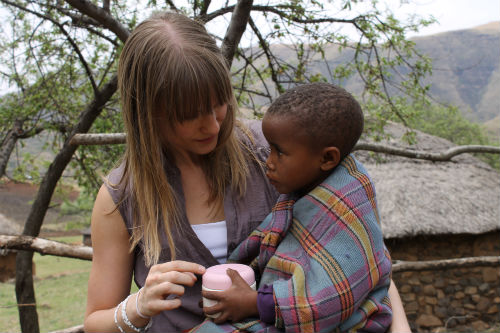
I still remember how I felt on World AIDS Day one year ago: filled with hope. I spent the morning listening to celebrities, CEOs, faith leaders, members of Congress and three U.S. presidents do something rare in DC: agree with one another. What was even more inspiring was that the bold vision they all touted in their remarks -- "the beginning of the end of AIDS" -- for the first time no longer felt impossible, coming off a year filled with new scientific data suggesting that we had the tools to finally begin breaking the back of the pandemic.
I also remember how I felt after the International AIDS Conference just seven months later: deflated. The conference was full of dignitaries and speeches, but at the end of the week, I felt a sense of rhetoric-fatigue. There was so much talk of turning the tide on AIDS, and yet it still felt challenging to point to what world leaders were doing differently, and how they were moving the ball forward.
So this year, to commemorate World AIDS Day, ONE took a hard look at how much progress the world has actually made on AIDS and analyzed which countries had been leaders and laggards in the fight. Our new report, "The Beginning of the End? Tracking Global Commitments on AIDS," shows that although significant progress has been made, if we maintain the status quo on treatment and prevention, we won't see the beginning of the end of AIDS until 2022. Not exactly a message of hope.
Some of the largest hurdles to achieving accelerated progress on this vision are a lack of resources and coordination. Set against a $6-$8 billion annual AIDS financing gap, the report finds huge variance among donors' contributions. Countries such as the United States have led the way in funding, political rhetoric and strategy development; others, including many in Europe, are contributing significant resources, but could contribute more financially and politically. Many donors still do not have strong global AIDS strategies to focus their investments, and this has led to gaps in the global response, with no clear sense of responsibility for achieving the broader UN political targets on AIDS agreed upon in 2011.
 A Global Fund and EGPAF supported clinic in rural Lesotho that provides services for thousands of people who live in the mountains behind it.
A Global Fund and EGPAF supported clinic in rural Lesotho that provides services for thousands of people who live in the mountains behind it.
Encouragingly, low- and middle-income countries are for the first time contributing more than half of the global resources for AIDS, but there, too, is still much room for growth. In particular, as of 2010, only four African countries have met their Abuja commitment of spending 15 percent of their national budgets on health, and 13 countries would need to double, triple, or quadruple their spending to achieve the commitment by 2015.
Yet I still have cause for hope on World AIDS Day 2012, because 2013 will provide a number of key moments at which stakeholders can signal how serious they are about achieving the beginning of the end of AIDS. The Global Fund's fourth replenishment meeting in 2013 offers donors, both traditional and new, the opportunity to reinvest in the Global Fund's critical work. Strong support will signal confidence in the Global Fund's new funding model, designed to more consistently target resources towards countries with the highest burden and the greatest need. With sufficient new resources, the Global Fund will be well positioned to deliver significant results toward the beginning of the end of AIDS.
 Erin with Motselisi, a five-year-old girl alive on ARVs supported by the Global Fund.
Erin with Motselisi, a five-year-old girl alive on ARVs supported by the Global Fund.
In 2013, global leaders will also discuss a new post-2015 global development framework. As leaders debate this framework, they must not lose sight of the current set of Millennium Development Goals (including MDG 6 focused on AIDS and other infectious diseases), and should adopt more of a "war room" mentality in getting the job they've already committed to getting done by 2015.
Without scaled-up financing, more targeted programming and expanded political will, the beginning of the end of AIDS will remain a distant ambition. But with concerted action, the world can chart a course towards ending this pandemic. To help make this transformation real, we need your help in creating a sense of urgency and asking leaders from around the world to step up. Please sign ONE's AIDS petition, post a surprising fact you learned from this report on Twitter or Facebook, or download the e-reader version for your favorite global health-loving family member this holiday season.